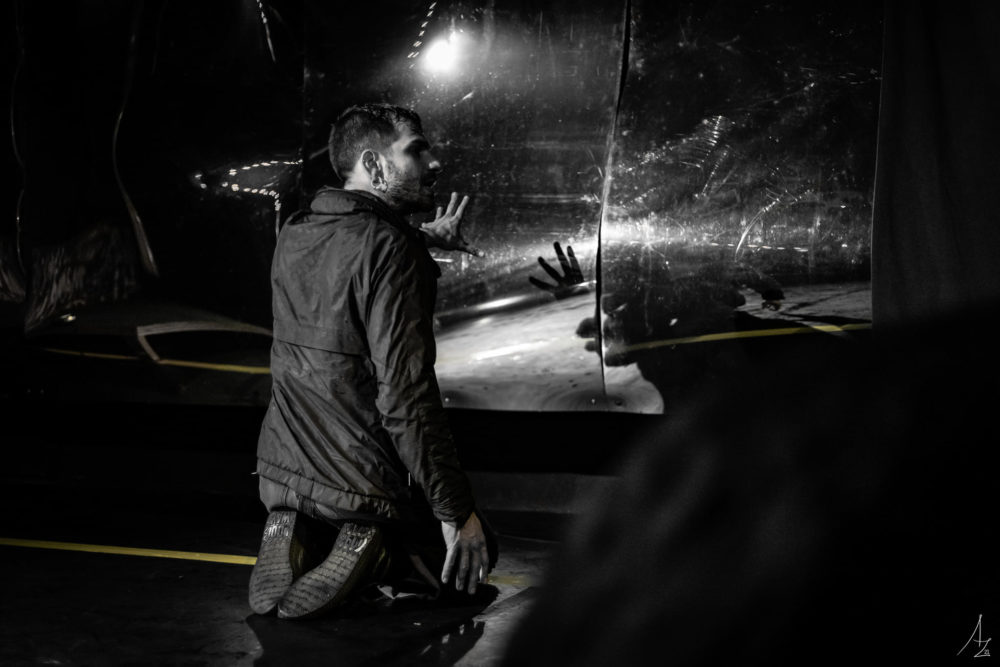(Photo: Aúrero Gómez)
A text, a director, an actor, and the theater is possible. If the text is by Bernard-Marie Koltés, the director is called César Barló and the actor is José Gonçalo Pais, then good theater is a reality, like the one that AlmaViva Teatro offered, with the title “The night just before the woods ”, Which took place on March 26 at La Teatrería de Ábrego, where the VII SOLO TÚ International Theater Show is taking place.
Author, director, actor, and the rain that floods, on a Friday night, the streets of a city, through which he wanders, his soul soaked with rage, a character whose non-identity is that of a foreigner, a stranger, different, which would make him invisible even in sunlight.
A character, who is looking for a place to spend the rest of the night, not in the rain, but indoors, and find someone with whom to share anger, loneliness and despair.
It is not a needy search, nor is it demanding, but it is so pressing, as improbable of encounters, if not comforting, yes of relief, which leads him to talk to himself, turning the monologue into a false dialogue, through a mirror game, in which the recipients of his imprecations fit, and a handheld camera, with which he projects his own face, face to face, but on the other side of the stage, far away, as if distancing himself from himself the echo of his voice reached those who consider to be guilty of their loneliness on a rainy night, knowing that they will only find equals in the difference, that they appear for a moment, lonely bodies and souls, of the same regrettable condition.
Having discarded goodness, the character dreams of beauty, which can only be that of the ideal woman, whose love is forbidden, and who is not the one he finds on the edge of a bridge, with whom sex is , for the character, a kind of true love, which, how could it be otherwise, disappears beyond the night and the rain, as if it had never appeared.
Koltés’s text is from 1977. It has been represented frequently, and it may continue to be represented many more times, because the socio-political-economic reality not only makes it possible, but also necessary.
I have read to some critic that what Koltés does is an x-ray of the asphalt, of the cities, in whose streets and squares he finds the stain of the tumor of the different, of the stranger, of the foreigner, which multiplies, and must be eradicated, expelled, but it resists and rebels, no matter how aggressive the treatment, which it is.
I have for me that it could well be, the text of Koltés, for an autopsy of some powers killed to compassion “with” the other, a disease that is contagious to broad social sectors, which have their redemptive alibi in solidarity and humanitarian associations, that they feel sorry for “the victims,” and act accordingly.
But the search for the character without a name, because there are many names he can have, is a cry, not for charity, but for justice; for humanity, not for humanitarianism; by acceptance, not by paternalism, in the least bad of cases.
The author has composed a poetics of loneliness, helplessness, desolation, but not resignation, with a powerful language, without concessions to condescension.
A harsh poetic, in whose harshness the director has placed the emphasis, even in brief moments, in which the lyricism of the character’s reveries appears, in which the frenetic rhythm of a powerful interpretation subsides, in accordance with the powerful word What does he say, not even when with his naked torso and his hands tied, still with his back against a wall, this spectator has wanted to see an Ulysses, who, hearing a sublime aria, resists falling into his beautiful deception, siren songs with which to annul his will to pursue his dreams in a better world possible, however improbable, since the spaces for freedom, green spaces and forests are closed and protected by snipers, as the character bitterly confirms.
José Gonçalo Pais makes his character pass through a repertoire of moods, all of them dominated by the exasperation of a frustration, against which he revolts in one, as agitated as it is portentous performance, even when he seems to be collected in himself, he already speaks to himself, in the absence of an interlocutor sought and not found.
The intensity that was experienced on stage penetrated the viewer’s consciousness and sensitivity, not only that of this viewer, according to the rain of applause, which fell on the actor, on behalf of the author and the director. Rain kind to the actor, on the night of another Friday, and that his character would have wanted for himself in the solitude of that Friday night – of so many Fridays – of relentlessly aggressive rain. Rain that, in La Teatrería, accompanied. We accompany each other.
–

